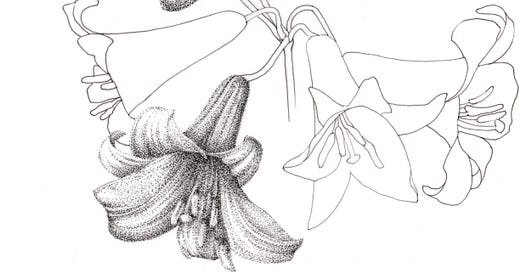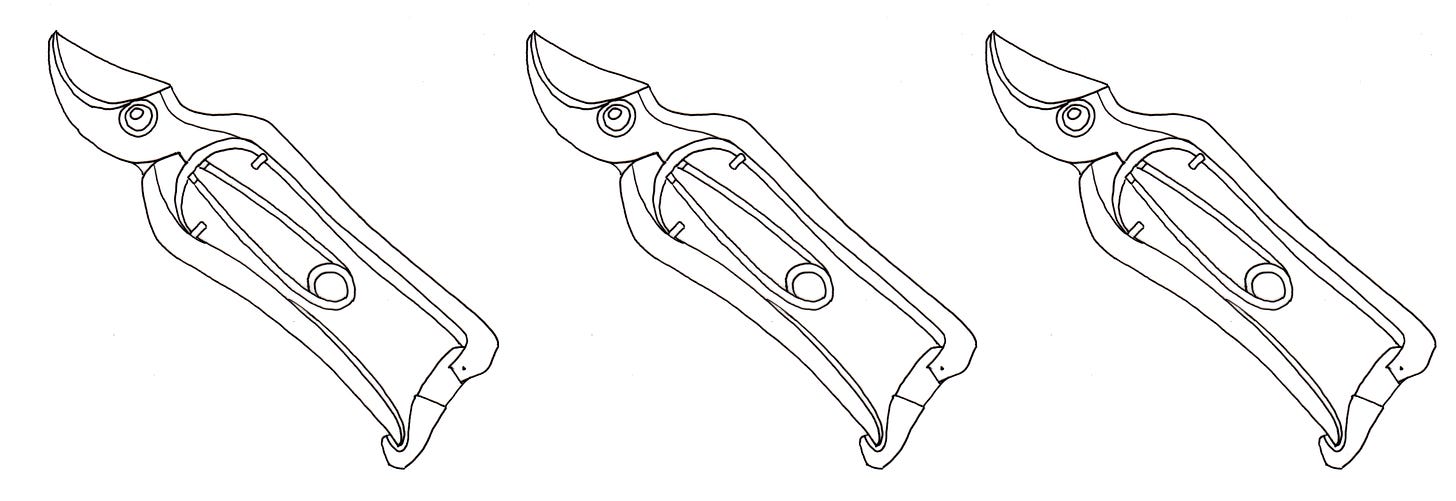We are now well past the solstice. There are those including my sun-loving elder daughter who welcome that date as the start of summer and give heartfelt thanks for the onset of hot weather. For me, however, this time of year is always touched with regret, with a sense of decline. The anticipation and the freshness of spring are over. The young chickadees have fledged, the hummingbird babies have flown to higher elevations, the ferns have un-scrolled and the tender foliage of the maples has lost its innocence. The frondescence, that great outpouring of spring energy, is running out of steam – and so am I. My gardening to-do list has stagnated.
Of course, I should give myself a shake. Our daughter is quite right to celebrate this gloriously abundant season and from now on I intend to join her in savouring every moment of it, which is why I’ve come to the roadside bed this early morning with my nifty Japanese clippers and a bucket half filled with water.
This bed is too shady for the tall regal lilies that grow here, but here they remain in the hope that passersby will be swept up in their heady perfume and give thanks for the gift of life. As far as I know this has yet to happen. It’s also too shady for the shrub roses that I planted here, and every winter I decide to replace them with something more suitable, then every summer I rediscover that I need them, so here they remain. Their fragrance seems to evoke a sense of nostalgia even in people who’ve never had the chance to experience it before. When presented with a truly rosy-smelling bloom, they take a tentative sniff then draw a deeper breath, close their eyes and murmur as if trying to remember something long forgotten.
The sun is bright already, and I bring the bucket, now filled with a haul of loveliness, to work under the table umbrella on the deck. One of my most treasured possessions is a crystal rose bowl which belonged to my great grandfather Thomas who lived in a small Scottish town, sported a ginger beard, played bass drum in the local pipe band and (according to family lore) consistently won trophies in the annual flower shows. His bowl is fitted with ingenious wire mesh and loops that make flower arranging a cinch.
My expanding floral composition begins to remind me of those Dutch still-life paintings from the seventeenth century in which voluptuous roses, mysteriously mixed with spring-flowering tulips, burst into such full-blown gorgeousness that some of the petals are obliged to fall and lie perfectly placed on the table below. In a few days, petals will drop onto our own dining table in a fragrant and flagrant display of luxury, and we’ll fancy that we live the good life of wealthy burgemeesters.
I carry my creation into the house as proudly as if it were a crown. Look, great grandfather, do you approve? He notices the blemish of blackspot on a leaf. Of course, he does – this is not a man to be easily impressed – but I catch him smiling behind his beard.
The extravagant scent and the sultry colours along with great grandfather’s blessing have done the trick. I’m now thoroughly and happily ensconced in the maturity of summer, no longer hankering after spring’s naïveté. Elder daughter, you’ll be happy to hear that I’m about to dig out the sunscreen, the sun hat and the shades, loosen my imaginary stays and abandon myself to the glories of the season. Bring on the zinnias!
OUCH!
I was so absorbed in gathering my bouquet of roses I hardly noticed that I’d hooked myself on a thorn. Now I’m nursing a painful thumb and feeling grouchy.
Ne’er a rose without a thorn! Many poets and philosophers – possibly too many – have had a stab at that discouraging theme. John Lydgate, a monk born in 1370, seems to have kicked the whole thing off with “There is no rose Spryngyng in gardeyns, but ther be sum thorn.”
Brother John’s inventively spelled insight may have been true in his day but now, thanks to careful breeding, many thornless versions are available. Why, I wonder, didn’t I plant some of those? And while I’m in a cross and picky frame of mind, I’d like to point out that roses don’t even possess thorns which, botanically speaking, are sharp stems. Instead, they have those horrible ‘prickles’ which grow out from the bark, and which, believe me, hurt.










Black raspberries? They sound delicious – are they some kind of cross with blackberries? I'm sorry to hear about the 'tennis elbow' but now that I've seen just how many roses you have, I'm not at all surprised. Maybe we should rename it 'dead-header's tendinitis'.
Lovely prose, my garden is delivering up Shasta daisies and black raspberries galore. The roses are so in need of dead heading and I did one side of the fence and ended up with tendinitis so it will slowly progress to get fresh blooms.